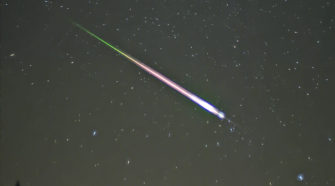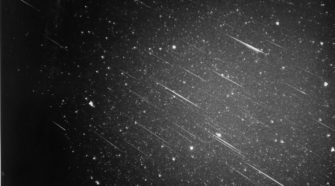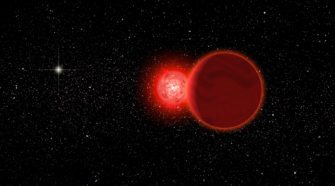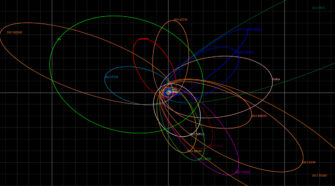Ice and Stone
This Week in History: November 15-21
NOVEMBER 15, 1927: Arnold Schwassmann and Arno Wachmann at Hamburg Observatory in Bergedorf, Germany, discover a very unusual comet, 29P/Schwassmann-Wachmann 1, that travels entirely between the orbits of Jupiter and Saturn and that undergoes repeated outbursts at irregular intervals. It is this week’s “Comet of the Week.” NOVEMBER 15, 2016: Polish astronomers Filip Berski and …
Comet of the Week: 29P/Schwassmann-Wachmann 1 1927j
Perihelion: 1925 May 7.84, q = 5.475 AU One of the most unusual and remarkable comets that we know about was discovered just a little less than a century ago, when on November 15, 1927, the duo of Arnold Schwassmann and Arno Wachmann at Hamburg Observatory in Bergedorf, Germany, found it on photographs as it was …
Special Topic: Comets and Meteor Showers
I first began to show an interest in astronomy when I was 6 years old, although my interests shifted between astronomy and various other scientific fields over the next few years. My father was an early riser, and one morning when I was 8 he was engaged in his normal morning routine when he noticed that …
This Week in History: November 8-14
NOVEMBER 10, 2018: Astronomers Scott Sheppard, David Tholen, and Chad Trujillo discover the distant object 2018 VG18 – nicknamed “Farout” – located at a present heliocentric distance of 124 AU, at that time the most distantly observed object in the solar system. 2018 VG18 and other distant objects in the solar system are the subject …
Comet of the Week: “Tycho Brahe’s Comet” C/1577 V1
Perihelion: 1577 October 27.45, q = 0.178 AU In all of astronomical history, one of the names that stand out is that of the 16th Century Danish astronomer Tycho Brahe. Of noble birth, he showed an interest in astronomy at a young age, although his family tried to steer him into a career in statesmanship; however, …
Special Topic: The Far Outer Solar System
It essentially goes without saying that our knowledge of all regions of the solar system has grown enormously during the past few decades. What we might call the “outer solar system,” i.e., beyond Neptune, is a region where our knowledge has perhaps grown the most, since until quite recently we knew almost nothing about this …






